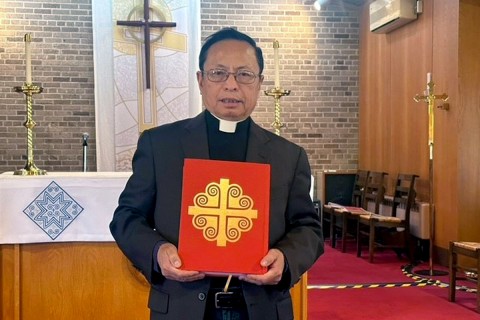The Anglican Communion's only Hmong-majority church thrives in Minnesota

Wa Meng Lor holds the English-Hmong book of Sunday Gospel readings he created. (Courtesy photo)
Compiling a book of the Sunday Gospel readings in both English and Hmong is just the latest way Wa Meng Lor has helped members of the Church of the Holy Apostles in St. Paul, Minnesota, join their Hmong roots to their life in the United States.
Since 2019 Lor has been the vicar of the only majority-Hmong congregation in the Episcopal Church. Its members have roots in Laos, a Southeast Asian country that shares a border with Vietnam. And, he believes, his is the only majority-Hmong church in the Anglican Communion.
Lor started the parallel-text project during the early days of the COVID-19 pandemic when in-person services were suspended and he found himself with extra time on his hands. The church covered the cost of printing 10 copies of the large book, bound in dark red with a traditional Hmong symbol printed in gold on the cover.
Having the two versions side-by-side in one volume will be a particular help on Sunday mornings since the worship service at Holy Apostles is bilingual.
“Before we had to carry two books, and now it’s only one,” Lor said. Offering the service in both languages not only helps the handful of English-speaking members but also younger Hmong members, who may not speak Hmong, as well as older members who only speak Hmong, he said.
Lor’s story, from growing up in Laos to becoming the leader of Holy Apostles, mirrors that of many church members who are part of a Hmong community that came to the United States as political refugees. After the Laotian government fell to communist forces in 1975, Hmong people were targeted and hundreds of thousands were murdered because many had fought alongside United States troops in spillover conflicts resulting from the Vietnam War.
Lor, who is 63, grew up practicing the traditional Hmong religion of ancestor worship mediated by a shaman. When he was 14 and learned that a beloved cousin had become a Christian, he tried to talk him out of it. “We hated Christians because we thought they destroyed our culture,” he said. “I asked him why he did this, and why he betrayed his family.” But as the cousin explained the Christian faith to him it “hit his heart.”
The cousin then taught him the Lord’s Prayer, and from that moment he considered himself a Christian. He secretly attended church with his cousin for months before telling his parents. He assured them there was no shame in being Christian, and a year later, they joined him. But by then, the Roman Catholic missionaries who had worked in Laos had fled the country, leaving no one available to baptize them.
In 1978 Lor decided he, too, needed to leave Laos, and he made his way to a refugee camp in Thailand, where he finally was baptized. Thanks to a US-based sponsor, a year later he arrived in Denver, Colorado, and in 1982 he moved to St. Paul, which had become a hub for many of the wave of Hmong refugees being resettled in the US.
He and many others were faithful Roman Catholics, but they took issue with the church’s requirement of an all-male, celibate priesthood. Because Hmong culture is family oriented, Lor said, they wanted to find a church that offered the sacraments they loved, but that allowed priests to marry, and where they could maintain their culture, language, and celebrations.
The search led them to the Episcopal Church, a denomination they hadn’t heard of before, and to Holy Apostles, where membership was dwindling. Then-Bishop James Jelinek had plans to close the church. After meeting with the church’s vicar, the Hmong community felt they had found a new church home, and in late 2004, 75 Hmong families, totaling several hundred people, became members. More than 200 Hmong people were confirmed the following year, and one of them, Toua Vang, went on to seminary. In 2013 he became the first Hmong priest in the Anglican Communion.
Today about 125 families are members of Holy Apostles—about a dozen of which are non-Hmong—and an intensive formation program developed a decade ago has created a robust ministry team to serve them, made up of lay leaders, two deacons and three priests. Lor is one of those priests, along with Bao Moua, the first Hmong woman to be ordained in the Episcopal Church.
Lor said that having a team of clergy helps meet the needs of the congregation, especially the Hmong members, who have different expectations of clergy than the English-speaking members do. Hmong members expect the priest’s presence at hospitals and weddings, but also for graduations and family parties as well. Events won’t start until the priest arrives.
“They have me booked up until September,” he said.
Craig Loya, bishop of the Episcopal Church in Minnesota, said in an interview that Holy Apostles is growing and is “an incredibly vital congregation.” In April he confirmed more than 40 church members, and Lor said that scheduling conflicts kept even more from being present.
Hmong is one of five languages spoken in Minnesota Episcopal congregations, Loya said, and that diversity is a true gift.
“For us as followers of Jesus to confess God as Trinity means that we affirm the heart of the universe is friends without division and unity without uniformity.” Loya added, “Any time we encounter any form of diversity, we are always closer to the heart of God.” —Episcopal News Service





